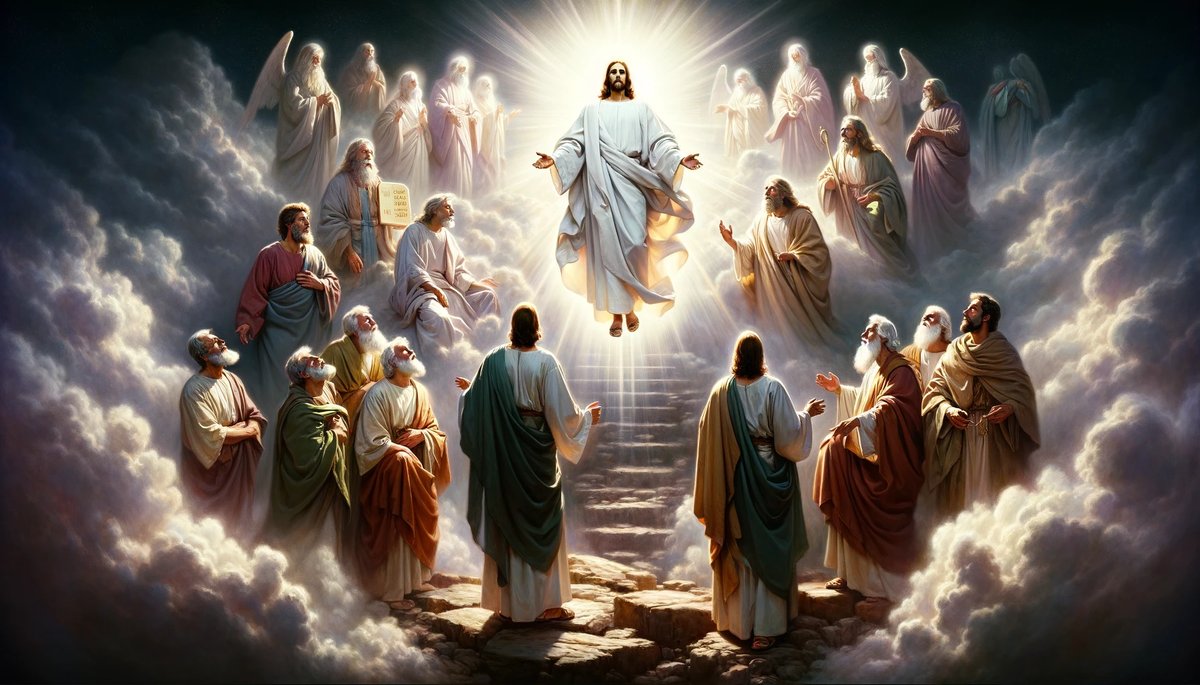Home>Christian Videos>Bible Stories>What Is Jesus Christ’s Religion


Bible Stories
What Is Jesus Christ’s Religion
Published: March 1, 2024
Peter Smith, Editorial Director at Christian.net, combines deep insights into faith, politics, and culture to lead content creation that resonates widely. Awarded for his contributions to religious discourse, he previously headed a major organization for religious communicators, enhancing dialogue on faith's societal impacts.
Discover the truth about Jesus Christ's religion and explore the significance of Bible stories in understanding his teachings and legacy. Uncover the timeless wisdom and spiritual guidance within the Bible.
(Many of the links in this article redirect to a specific reviewed product. Your purchase of these products through affiliate links helps to generate commission for Christian.net, at no extra cost. Learn more)
Table of Contents
The Historical Context of Jesus Christ
Jesus Christ was born in Bethlehem, a small town in Judea, during the reign of King Herod the Great. He grew up in Nazareth, a town in Galilee, and began his public ministry around the age of 30. During this time, Judea was under Roman rule, and the Jewish people were awaiting the arrival of a Messiah who would deliver them from oppression. Jesus' teachings and actions took place within this historical and cultural backdrop, shaping his religious identity and the impact of his message.
-
Jewish Tradition and Expectations: Jesus was born into a Jewish family and was raised in accordance with Jewish customs and traditions. His teachings often referenced Jewish scriptures and traditions, and he engaged in debates with Jewish religious leaders. The historical context of Jesus Christ's life and ministry is deeply intertwined with the rich tapestry of Jewish religious beliefs and practices.
-
Roman Occupation and Political Unrest: The Roman Empire exerted significant influence over the region where Jesus lived and preached. The presence of Roman authorities and the imposition of Roman laws and taxes contributed to a climate of political unrest and social upheaval. Jesus' teachings often addressed issues of justice, compassion, and the nature of authority within this historical context.
-
Cultural Diversity and Religious Syncretism: The region where Jesus lived was characterized by cultural diversity and religious syncretism. Various religious beliefs and practices coexisted, creating a complex religious landscape. Jesus' interactions with individuals from diverse backgrounds and his inclusive teachings reflected the cultural and religious diversity of the time.
-
Messianic Expectations and Religious Revival: The historical context of Jesus Christ's life was marked by messianic expectations and religious revival movements. Many people were anticipating the arrival of a messianic figure who would bring about spiritual renewal and liberation. Jesus' ministry and the fervor surrounding his teachings were deeply influenced by these religious and spiritual currents.
In understanding the historical context of Jesus Christ, it becomes evident that his religious identity and teachings were intricately connected to the socio-political, cultural, and religious dynamics of his time. This context provides valuable insights into the development of Jesus' religious mission and the enduring impact of his message on the world.
Read more: What Religion Was Founded By Jesus Christ
The Teachings and Beliefs of Jesus Christ
Jesus Christ's teachings and beliefs form the cornerstone of his religious identity and have profoundly influenced the development of Christianity and other world religions. His message centered on love, compassion, and the kingdom of God, offering a transformative vision of human existence and spiritual fulfillment. Here are some key aspects of Jesus Christ's teachings and beliefs:
-
Love and Compassion: Jesus emphasized the paramount importance of love and compassion in human relationships. His teachings urged individuals to love their neighbors as themselves, to show kindness to those in need, and to forgive others. The concept of agape, or selfless love, permeated his message and became a defining characteristic of Christian ethics.
-
The Kingdom of God: Central to Jesus' teachings was the proclamation of the kingdom of God. He invited people to embrace a new way of living and to participate in the realization of God's reign on earth. This kingdom was characterized by justice, mercy, and the restoration of brokenness, offering hope for a world transformed by divine grace.
-
Ethical Principles: Jesus articulated ethical principles that emphasized humility, peacemaking, and moral integrity. His teachings challenged conventional notions of power and status, calling for a radical reorientation of values and priorities. The Sermon on the Mount, in particular, encapsulates his ethical teachings and their profound implications for personal and communal life.
-
Salvation and Redemption: Jesus' beliefs centered on the concept of salvation and redemption, offering a path to spiritual liberation and reconciliation with God. He spoke of the forgiveness of sins, the healing of brokenness, and the restoration of wholeness through faith and repentance. His teachings emphasized the transformative power of grace and the promise of eternal life.
-
Inclusivity and Equality: Jesus' teachings reflected a radical inclusivity that transcended social barriers and cultural divisions. He welcomed the marginalized, embraced the outcast, and challenged discriminatory practices. His beliefs affirmed the inherent worth and dignity of every individual, regardless of social status or background.
-
Divine Sonship and Messianic Identity: Jesus' teachings and beliefs also revolved around his unique relationship with God as the Son of God and the promised Messiah. He proclaimed his divine mission to fulfill the scriptures and to inaugurate a new era of spiritual fulfillment and divine favor.
The teachings and beliefs of Jesus Christ continue to inspire and guide millions of people around the world, shaping their understanding of faith, morality, and the purpose of human existence. His profound insights into the nature of God, the human condition, and the ethical imperatives of love and justice have left an indelible mark on religious thought and practice, transcending cultural and historical boundaries.
The Influence of Jesus Christ on World Religions
-
Christianity: The most direct and profound influence of Jesus Christ is evident in the development and expansion of Christianity. As the central figure of the Christian faith, Jesus' life, teachings, and sacrificial death form the core of Christian theology and practice. His influence is manifested in the beliefs, rituals, and ethical principles of Christian communities worldwide, shaping their understanding of God, salvation, and the purpose of human life.
-
Islam: Jesus Christ holds a significant place in Islam as a revered prophet. The Quran acknowledges his miraculous birth to the Virgin Mary and attributes numerous moral and spiritual virtues to him. While there are theological differences regarding his divinity, Muslims honor Jesus as a righteous messenger of God, and his teachings have left an indelible mark on Islamic spirituality and ethical conduct.
-
Judaism: Although Jesus' role in Judaism is a subject of theological divergence, his teachings and the socio-religious context of his time have influenced Jewish thought and ethical discourse. Concepts such as love for one's neighbor, social justice, and ethical conduct, which Jesus emphasized, resonate with Jewish ethical teachings and have contributed to interfaith dialogue and mutual understanding.
-
Buddhism and Hinduism: The universal themes of compassion, selflessness, and spiritual enlightenment found in Jesus' teachings have resonated with followers of Buddhism and Hinduism. While not central to these traditions, Jesus' emphasis on love, forgiveness, and inner transformation has sparked dialogue and comparative studies, enriching the spiritual landscape and fostering interfaith connections.
-
Secular and Humanist Movements: The ethical and humanitarian dimensions of Jesus' teachings have transcended religious boundaries, influencing secular and humanist movements. His advocacy for social justice, care for the marginalized, and the pursuit of peace has inspired non-religious individuals and organizations to champion causes of human dignity, equality, and compassion.
-
Global Cultural Impact: The figure of Jesus Christ has permeated global culture, influencing literature, art, music, and popular discourse. His life and teachings have inspired countless works of creativity and intellectual inquiry, contributing to the enrichment of human expression and the exploration of profound existential questions.
The influence of Jesus Christ on world religions extends far beyond doctrinal boundaries, shaping moral and spiritual landscapes, fostering interfaith dialogue, and inspiring diverse expressions of faith and humanistic values. His enduring impact continues to resonate across religious traditions and cultural contexts, enriching the tapestry of human spirituality and ethical discourse.
The Controversies Surrounding Jesus Christ's Religion
The religious identity of Jesus Christ has been a subject of profound controversy and theological debate throughout history, giving rise to diverse interpretations and conflicting perspectives. These controversies stem from differing theological, historical, and cultural contexts, each contributing to the complex tapestry of beliefs and assertions surrounding Jesus' religious affiliation. Here are some of the key controversies that have shaped discussions about Jesus Christ's religion:
-
Divine Sonship and Trinity: One of the central controversies revolves around Jesus' divine sonship and his relationship within the Trinity. Christian theology asserts the belief in Jesus as the Son of God and the second person of the Trinity, a concept that has been a point of contention with other religious traditions and philosophical perspectives. Debates about the nature of Jesus' divinity, his pre-existence, and his role within the Godhead have engendered theological disputes and doctrinal divisions.
-
Jewish Messianic Expectations: Within the context of Judaism, the question of Jesus' messianic identity has been a source of controversy. While Christianity regards Jesus as the long-awaited Messiah prophesied in Jewish scriptures, traditional Jewish perspectives reject this claim, leading to divergent interpretations and theological discord. The historical and cultural expectations of the Messiah within Judaism have contributed to the complexities of this controversy.
-
Historical Reliability and Interpretation: The historical accounts of Jesus' life, teachings, and religious identity have been subjected to critical scrutiny and scholarly inquiry. Controversies surrounding the reliability of biblical narratives, the historical context of Jesus' ministry, and the interpretation of ancient texts have given rise to diverse theories and conflicting assessments. These controversies intersect with broader discussions about the nature of religious truth and the historical Jesus.
-
Interfaith Perspectives and Comparative Religion: The engagement of Jesus' religious identity within interfaith dialogue and comparative religion has generated controversies regarding the uniqueness of Christian claims and the diversity of religious expressions. The juxtaposition of Jesus' teachings with those of other religious figures, the examination of parallel motifs in religious narratives, and the implications for religious pluralism have sparked contentious debates and differing viewpoints.
-
Cultural and Sociopolitical Appropriations: The appropriation of Jesus' religious identity within diverse cultural, sociopolitical, and ideological contexts has led to controversies surrounding the representation and reinterpretation of his teachings and significance. The use of Jesus' image and message for various agendas, the politicization of religious narratives, and the intersection of faith with power dynamics have given rise to ethical and theological controversies.
-
Modern Interpretations and Secular Critiques: In contemporary discourse, the interpretation of Jesus' religious identity has been subject to modern reinterpretations and secular critiques. The questioning of traditional religious narratives, the exploration of historical Jesus studies, and the reevaluation of theological constructs have engendered controversies regarding the relevance and authenticity of Jesus' religious persona in the modern world.
The controversies surrounding Jesus Christ's religion reflect the multifaceted nature of religious inquiry, the complexities of historical and theological interpretation, and the enduring impact of his life and teachings. These controversies continue to provoke profound reflections, scholarly investigations, and spiritual discernment, contributing to the ongoing dialogue about the significance of Jesus Christ within religious and cultural landscapes.
The Modern Interpretations of Jesus Christ's Religious Identity
In contemporary times, the religious identity of Jesus Christ has been the subject of diverse and evolving interpretations, reflecting the intersection of religious, cultural, and intellectual currents. Modern scholars, theologians, and religious practitioners have engaged in nuanced explorations of Jesus' religious persona, seeking to discern the relevance and implications of his teachings in the context of contemporary spirituality and religious discourse. Here are some key aspects of the modern interpretations of Jesus Christ's religious identity:
-
Historical Jesus Studies: The field of historical Jesus studies has witnessed a resurgence of scholarly interest, prompting rigorous investigations into the historical context of Jesus' life, the authenticity of biblical accounts, and the socio-religious milieu of first-century Judea. Modern interpretations seek to uncover the historical Jesus behind the layers of theological accretions, offering fresh insights into his religious mission and cultural significance.
-
Interfaith Dialogue and Comparative Theology: In an era characterized by interfaith engagement and religious pluralism, modern interpretations of Jesus Christ's religious identity have been enriched by dialogues with other religious traditions. Comparative theology and interfaith encounters have prompted a reevaluation of Jesus' teachings in light of diverse spiritual perspectives, fostering mutual understanding and the exploration of shared ethical values.
-
Postmodern and Secular Perspectives: Postmodern and secular critiques have engendered alternative interpretations of Jesus Christ's religious identity, challenging traditional religious paradigms and theological constructs. Postmodern thinkers have explored the symbolic, ethical, and existential dimensions of Jesus' message, emphasizing its relevance for contemporary moral discourse and the pursuit of human flourishing.
-
Feminist and Liberationist Readings: Feminist and liberationist interpretations have illuminated the religious identity of Jesus Christ from marginalized and oppressed perspectives, highlighting his solidarity with the marginalized, his critique of social injustices, and his advocacy for inclusive and egalitarian communities. These interpretations have underscored the transformative potential of Jesus' teachings for contemporary movements of social justice and human rights.
-
Ethical and Spiritual Relevance: Modern interpretations of Jesus Christ's religious identity have emphasized the enduring ethical and spiritual relevance of his teachings in addressing contemporary challenges. Themes of love, compassion, and social responsibility have been reappropriated in the context of global issues such as environmental stewardship, intercultural harmony, and the pursuit of peace, reflecting the adaptability of Jesus' message to contemporary moral imperatives.
-
Cultural and Artistic Expressions: The modern interpretations of Jesus Christ's religious identity have found expression in diverse cultural and artistic forms, including literature, visual arts, music, and popular culture. Creative reinterpretations of Jesus' religious persona have contributed to the exploration of existential questions, the critique of religious institutions, and the celebration of spiritual diversity, enriching the cultural landscape with multifaceted portrayals of Jesus' enduring impact.
The modern interpretations of Jesus Christ's religious identity reflect the dynamic and multifaceted nature of religious inquiry in the contemporary world. These interpretations encompass a spectrum of perspectives, from scholarly investigations to artistic expressions, and contribute to the ongoing dialogue about the significance of Jesus Christ within religious, cultural, and intellectual landscapes.















